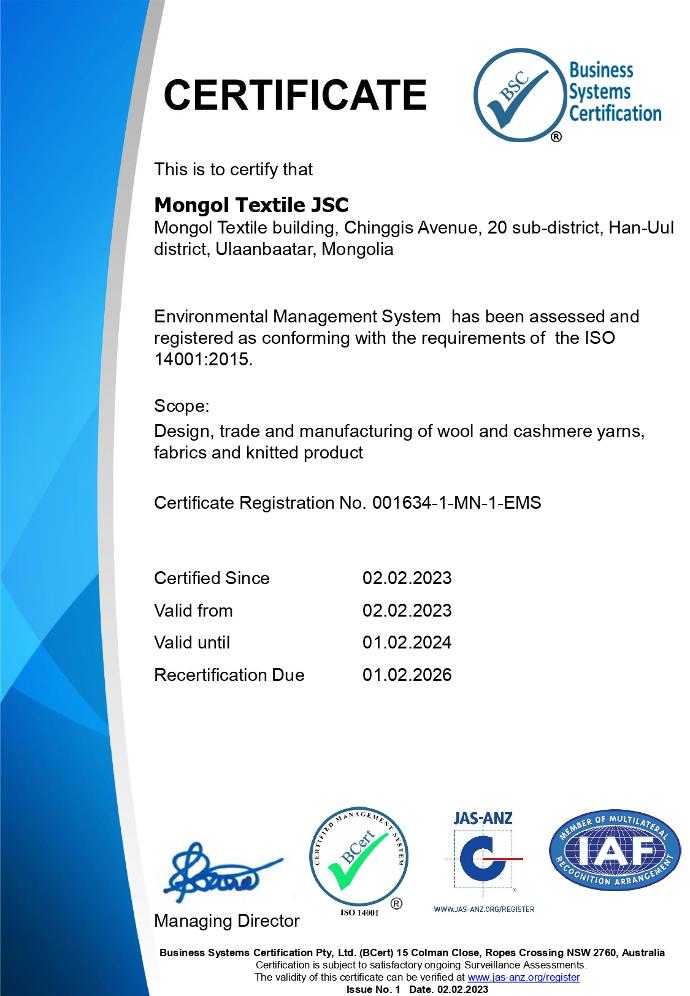Sustainability Policy
"Our company is committed to protecting the environment and preserving natural resources for future generations. We recognize that our operations have an impact on the environment, and we are committed to conducting our business in a responsible and sustainable manner.
To achieve this goal, we will:
- Comply with all relevant environmental laws and regulations set by the Mongolian government and International standards.
- Continuously improve environmental performance by setting and working towards measurable objectives and targets.
- Reduce our environmental impact by minimizing waste and pollution, conserving natural resources, and promoting the use of environmentally-friendly products and technologies.
- Engage with our stakeholders, including employees, customers, and the local community, to raise awareness of environmental issues and encourage environmentally-responsible behaviour.
- Collaborate with suppliers, partners, and other organizations to address environmental challenges and promote sustainability.
We are committed to taking a proactive approach to environmental protection, and regularly review and update our policies and practices to ensure that we meet our environmental responsibilities."
Sustainability Management
"Our company implemented ISO 14001:2015 environmental management system into our management structure. We are committed to developing long-term strategies for reducing the environmental impact of textile production and continuously improving the sustainability of the manufacturing process.
To achieve this goal, we will:
- Promoting sustainable consumption: By raising awareness about the environmental and social impacts of textile consumption, textile manufacturers can encourage customers to make more sustainable choices. For example, by providing information about different products' environmental and social impacts and promoting repair, reuse, and recycling.
- Investing in new technologies: Investing in new and innovative technologies can help textile manufacturers to improve their environmental and social performance. For example, using digital printing or 3D knitting can reduce textile waste, water and energy consumption and also allow for faster turnaround times for smaller orders.
- Collaborating with other organizations: Collaborating with other organizations and industry groups can help textile manufacturers to share knowledge, resources and best practices, and support collective efforts to promote sustainability.
- Measuring and reporting on sustainability performance: Measuring and reporting on sustainability performance can help textile manufacturers to understand their impacts and identify areas for improvement. By publicly reporting on their sustainability performance, textile manufacturers can also build trust and transparency with their stakeholders.
By implementing these initiatives and others, textile manufacturers can reduce their environmental impact, and support sustainable development while also helping to improve their reputation and build trust with customers and other stakeholders. Regularly reviewing and updating their sustainability initiatives will help textile manufacturers to keep pace with the latest developments and regulations in sustainability, and continue to improve their performance over time."

Sustainable Manufacturing
"Our company is committed to following MSN ISO 6926:2021 Sustainable textile manufacturing standard. This includes reducing the consumption of water, energy, and safe usage of chemicals, as well as responsible sourcing of raw materials, implementing safe and fair labor practices, and animal welfare. It also involves implementing recycling and waste management programs and adhering to regulations and industry standards. By implementing sustainable practices, textile manufacturers can reduce their environmental footprint and contribute to a more sustainable future for the industry as a whole. Lastly, this standard goes in hand with MNS 6891:2020 Responsible Nomad standard.
To achieve this goal, we will:
- Implementing a closed-loop production process: This involves recycling and repurposing textile waste to minimize the number of raw materials needed for production, and reduce the impact of textile waste on the environment.
- Sourcing materials from sustainable and environmentally friendly sources, such as wool, cashmere or Modal, reduces the environmental impact of textile production and also supports herder collectives who use sustainable practices.
- Implementing energy-efficient technologies, using renewable energy sources, and reducing greenhouse gas emissions can help the manufacturer to minimize its carbon footprint.
- Implementing water-saving practices, such as recycling and treating process water, can help the manufacturer to reduce its water consumption, and minimize pollution.
- Use of environmentally friendly chemicals and dyes. This includes using non-toxic and biodegradable chemicals, as well as dyes that are free from heavy metals and other harmful substances.
-
Invest in water treatment systems to minimize the environmental impact of dyeing processes.
By implementing MNS ISO 6926:2021, we can reduce the environmental impact of our operations. It's important to note that sustainability is a continuous process, it is important to regularly review and revise the initiatives, to align them with the latest environmental and social requirements."
This standard is approved by The Mongolian National Authority for Accreditation (MNAS), it will be audited by an external party and certification will be given by the Mongolian Wool and Cashmere Association.

To install this Web App in your iPhone/iPad press ![]() and then Add to Home Screen.
and then Add to Home Screen.
